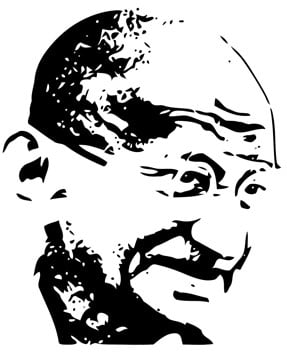Magazine
Gandhi For Dummies

| Even in the ignominious annals of India’s book censorship history, the Gujarat government’s decision to ban Joseph Lelyveld’s Great Soul: Mahatma Gandhi and His Struggle with India has to be exceptionally embarrassing.
Chief Minister Narendra Modi declared the book, which had not yet been released in India, “perverse … hurting the sentiments of those with capacity for sane and logical thinking” on the basis of a twisted review of an advance copy by a right wing, partisan British historian in the Wall Street Journal and a false and sensational cover story in a London tabloid, The Daily Mail, which labeled Gandhi a homosexual. In fact, the book, which only briefly explores the close relationship between Gandhi and one of his earliest Western disciples, the German architect Hermann Kallenbach, does not assert that Gandhi was homosexual and indeed goes to some length to refute such a reading. Lelyveld told Little India, that Gandhi “proclaimed himself a brahmachari and I believe he was a brahmachari …. It is a side issue and not very interesting, once you decide they were celibate.” But what has truth got to do with anything? A Google search for “Gandhi gay” throws up 6.4 million web links — nine times as many as for “Gandhi non violence,” for which he is most renowned. Characteristically, the precipitous, kneejerk reaction of the Modi government served only to fuel the media frenzy. Fortunately, the censorship juggernaut ran out of steam before other states and the central Indian government were stampeded into joining the ban. The book is now widely available throughout India and a Little India reporter was even able to find a copy in the library of the National Gandhi Museum in Rajghat in New Delhi, scarcely a center of perversity that Mr Modi would have us believe. The fabricated controversy (not that it would make a difference had the book actually made the claim it was alleged to have made) only served to bolster the book’s popularity — “helped sales quite a bit,” according to V.K. Karthika, chief editor of HarperCollins India, the Indian publisher of Lelyveld’s book.
“Insane and illogical” Gujarat residents can easily secure the book from a neighboring town across the border or even online. At this point, the backlash has had more ripples in the U.S., where two Indian American organizations in California and Massachusetts cancelled book readings by Lelyveld in the wake of the controversy. As we point out in our cover story, Gandhi himself would have taken the hoopla over his sexuality in stride, and very likely even encouraged and engaged it. He discussed his private life openly and once rebuked his Bengali translator at a prayer meeting for toning down his account of his controversial practice of sleeping naked with young women to test his vow of celibacy. Even more remarkably, when his stenographer Parsuram quit over these sexual experiments, Gandhi wrote: “I like your frankness and boldness… You are at liberty to publish whatever wrong you have noticed in me and my surroundings. Needless to say you can take whatever money you need to cover your expenses.” Clearly the self-appointed guardians of Gandhi’s legacy neither have read Lelyveld’s book nor have any understanding of the man they so venerate.
|

 HarperCollins rushed its printing to capitalize on the buzz, tripling its normal print run. The company has not experienced any backlash or distribution problems anywhere in India and Karthika said Great Soul was “probably one of the top” books in first month sales in its genre. According to Karthika, the book had “one of the fastest launches” for a hardcover nonfiction book in the popular history/biography category, which is remarkable as “it is a fairly literary text for sophisticated readers.”
HarperCollins rushed its printing to capitalize on the buzz, tripling its normal print run. The company has not experienced any backlash or distribution problems anywhere in India and Karthika said Great Soul was “probably one of the top” books in first month sales in its genre. According to Karthika, the book had “one of the fastest launches” for a hardcover nonfiction book in the popular history/biography category, which is remarkable as “it is a fairly literary text for sophisticated readers.”